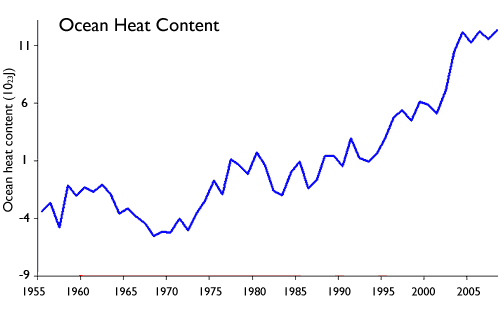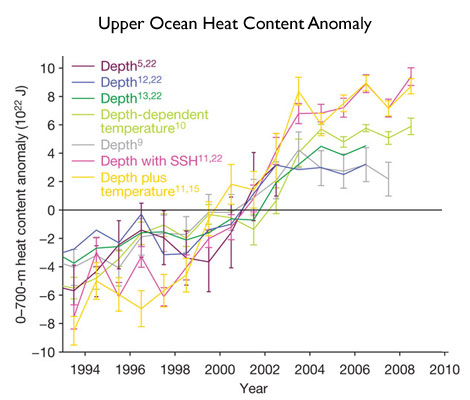Does ocean cooling prove global warming has ended?
What the science says...
| Select a level... |
 Basic
Basic
|
 Intermediate
Intermediate
| |||
|
The most recent ocean measurements show consistent warming. |
|||||
Climate Myth...
Oceans are cooling
“Ocean heat touches on the very core of the AGW hypothesis: When all is said and done, if the climate system is not accumulating heat, the hypothesis is invalid.
[…]Now that heat accumulation has stopped (and perhaps even reversed), the tables have turned. The same criteria used to support their hypothesis, is now being used to falsify it.” (William DiPuccio)
In 2008, climate change sceptic Roger Pielke Sr said this: “Global warming, as diagnosed by upper ocean heat content has not been occurring since 2004”. It is a fine example of denialist spin, making several extraordinary leaps:
-
that one symptom is indicative of the state of an entire malaise (e.g. not being short of breath one day means your lung cancer is cured).
-
that one can claim significance about a four year period when it’s too short to draw any kind of conclusion
-
that global warming has not been occurring on the basis of ocean temperatures alone
So much for the hype. What does the science say about the temperature of the oceans – which, after all, constitute about 70% of the Earth’s surface? The oceans store approximately 80% of all the energy in the Earth’s climate, so ocean temperatures are a key indicator for global warming.
No straight lines
Claims that the ocean has been cooling are correct. Claims that global warming has stopped are not. It is an illogical position: the climate is subject to a lot of natural variability, so the premise that changes should be ‘monotonic’ – temperatures rising in straight lines – ignores the fact that nature doesn’t work like that. This is why scientists normally discuss trends – 30 years or more – so that short term fluctuations can be seen as part of a greater pattern. (Other well-known cyclic phenomena like El Nino and La Nina play a part in these complex interactions).
Looking at the trend in ocean heat, this is what we find:

Source: Levitus 2009
There are, however, disputes about the accuracy of Argo buoys and expendable measuring devices dropped into the sea, and the reporting of temperatures down to only 700 metres. How do scientists resolve these kind of disputes – bearing in mind that such disputes are the very stuff of science, the essence of true scepticism? One way is to find more data sources – different ways of measuring the phenomenon in dispute. By using results from seven different teams of scientists, all using different tools and methods, we are able to see a clear trend. And while there is variation between team results due to the differences in technique and measurement methods, one thing they all agree on: long term, temperatures are going up.

Source: Lyman 2010
The reaction of the oceans to climate change are some of the most profound across the entire environment, including disruption of the ocean food chain through chemical changes caused by CO2, the ability of the sea to absorb CO2 being limited by temperature increases, (and the potential to expel sequestered CO2 back into the atmosphere as the water gets hotter), sea-level rise due to thermal expansion, and the amount of water vapour in the atmosphere.
While there is a great deal we don’t know about how the oceans behave, we do however know that it’s safer to discuss all aspects of climate change using multiple sets of data, rather than just one, as Pielke Sr did. If ocean heat is a guide, then global warming is still on track to cause great disruption if we don’t modify our actions to reduce the release of anthropogenic CO2.
Claims that global warming is not happening on the basis of short-term ocean temperatures are not supported by the evidence.
Basic rebuttal written by GPWayne
Last updated on 1 August 2013 by gpwayne. View Archives































 Arguments
Arguments






































A more recent sceptical argument is that, while the ocean appears to show the energy imbalance, the rate of warming is negligible. See for instance http://joannenova.com.au/2013/05/ocean-temperatures-is-that-warming-statistically-significant/ which alleges that the error from network of buoys is greater than thought (I didn't find that line convincing, but the temp graphs get recylced).
Judith Curry writes "with the 2nd law of thermodynamics, it is not easy to get much of that heat back to surface... since the 1960s, the warming of that layer [0-2000m] was 0.06 °C... can anyone figure out why 0.06C is a big deal for the climate".
Cheng, Zhu and Abraham find warming of 0.0061 °C/yr in 0-700m, close to models, but one naive question might be why this is less than half the rate of surface warming, and less than 1 °C in a century. Does this slowness mean the oceans will moderate or delay the surface warming more than thought? Is there a simple model to explain this? I wonder if this deserves its own article.
[Rob P] - As Tom Curtis points out, Judith Curry is engaging in a logical fallacy. Most of the heat accumulating in the ocean is in the 0-100 meter layer. See the image below for the 2015 anomaly.
This has drastic implications for marine life upon which humanity depends for sustenance and income. Coral reefs, for instance, are being destroyed at this very moment because the surface ocean has accumulated so much extra energy that marine heatwaves (associated with El Nino & the warming ocean) are killing coral on a global scale - only the 3rd worldwide bleaching event ever recorded.
Cedders @83, the SST has increased by about 0.8 C over the last century. It is that surface layer that impacts the atmosphere, and hence it is the most relevant part of the ocean data to answer Curry's question. Therefore she asks the question about the 0-2000 meter average, which warms very slowly in the deep ocean, brining the average down. That is, her question is no more than rhetorical slight of hand.
With regard to Cheng, Zhu and Abraham - yes oceans reduce the rate of warming, but they do not reduce the equilibrium temperature response.
Thanks Tom & Rob for replies. The map is indeed impressive and worrying for coral bleaching, mangrove swamp etc (what's the source & baseline period, please?).
I would still be interested in any simplified model, calculus or references that describe the coupling between the surface and the ocean layers: is the deep ocean warming rate expected to accelerate with further SST warming? How long will the 700-2000m layers take to reach equilibrium? If 88% of the heat imbalance is going into oceans, doesn't that mean the oceans are providing a huge air-con service, but one that will eventually disappear? It has policy implications, eg if Earth system sensitivity is 6 °C, but thermal inertia meant 'only' 60% of that surface warming even a century after reaching 550ppm, we might want to think seriously what human capabilities are going to be in the 22nd century.
I still would like to suggest if I may that this contrarian meme may have become sufficiently prevalent for SkS to examine thoroughly to produce a "basic" clarification for lay people like me. (I think UKIP in UK may have picked it up via WUWT.) Thanks again.